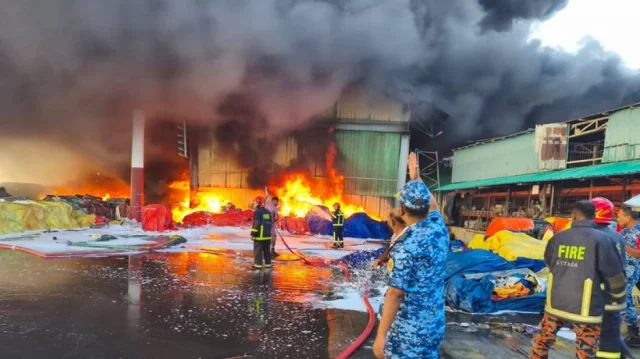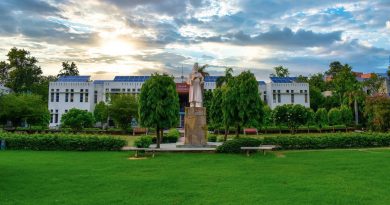Beneath the Smoke: The Hidden Geopolitics of the Dhaka Airport Fire
If foreign powers are allowed to rebuild and manage our logistics, the flames will have accomplished what no weapon could: the silent colonisation of our economic will.
A raging inferno has seared through the very heart of Bangladesh. The catastrophic fire that engulfed the cargo complex of Hazrat Shahjalal International Airport (HSIA) on 18 October 2025 was far more than an accident—it was a Brobdingnagian assault upon the nation’s soul, a fiery wound gouged deep into the flesh of our sovereignty.
Beneath the veil of smoke and confusion, one may discern the dark outline of a deliberate design—a sinister attempt to weaken the arteries of our economy and to corrode the foundations of our independence.
The Day the Gateway Burned
On that ill-fated afternoon, flames erupted near Gate 8 of the HSIA import-cargo village, spreading with terrifying speed through interconnected warehouses. Within hours, vast stocks of imported materials, export-ready apparel, and vital product samples—the lifeblood of Bangladesh’s garment industry—were consumed by the blaze.
It raged through the night, resisted containment for more than twenty hours, and by dawn left behind a charred wasteland of twisted steel, blackened concrete, and the acrid stench of ruin.
The cargo complex handles more than 600 metric tons of dry freight daily, its activity nearly doubling during the October–December export season. The timing of the disaster could not have been more devastating.
As the Bangladesh Garment Manufacturers and Exporters Association (BGMEA) lamented, thousands of sample consignments—“the very foundation of buyer confidence”—were destroyed. This may lead to cancelled contracts, delayed payments, and a grave erosion of trust in a US$47-billion sector that sustains nearly four million workers.
But the losses transcend mere commerce. Economists fear that indirect costs may exceed US$1 billion in disrupted logistics, missed export deadlines, diverted air routes, and fractured supply chains. The world’s second-largest garment exporter after China now faces not only an economic blow but a spiritual one—the shattering of national confidence.
This was no mere industrial mishap. It was an assault upon the republic’s lifeblood.
The Shadow of Design
To the casual observer, the HSIA blaze may appear accidental. Yet, when history and coincidence intertwine too neatly, vigilance must replace naivety. Within the same week, multiple industrial fires erupted across key export hubs of Bangladesh. Are we to believe these are unrelated? Or do these synchronized calamities bear the fingerprints of a coordinated effort to cripple Bangladesh’s trade network?
For decades, our land has been coveted as a strategic jewel in South Asia—where the tectonic plates of global power grind ceaselessly. Between China’s Belt and Road ambitions and America’s Indo-Pacific containment strategy, Bangladesh’s ports, islands, and transport corridors have become pieces on a grand geopolitical chessboard.
From Chittagong’s deep-sea port and the prospective Sonadia project, to Saint Martin Island and the expanding rail links toward Cox’s Bazar—our geography has become both our blessing and our curse.
In this context, the fire at HSIA—Bangladesh’s central cargo hub—cannot be dismissed as coincidence. This facility is the beating artery of our export economy. When it falters, foreign logistics operators, investors, and intelligence-linked agencies gain openings to insinuate themselves into our infrastructure.
What begins as “disaster relief” often ends as quiet domination. Thus, a charred cargo village could become the Trojan horse for external control over our most vital economic organ.
Consider the invisible strategies of hybrid warfare—where guns are replaced by financial instruments, and sabotage masquerades as accident. A sudden fire, an offer of “assistance,” a foreign management proposal—and gradually a nation’s sovereignty erodes, not with explosions, but with contracts and consultancy.
This inferno, in that light, is not merely an act of destruction—it is a geopolitical stratagem, a modern act of subversion cloaked in smoke.
Freedom Under Fire
Nelson Mandela once observed, “For to be free is not merely to cast off one’s chains, but to live in a way that respects and enhances the freedom of others.”
In the glowing embers of the HSIA cargo village lie the singed dreams of millions—the women of Gazipur, Narayanganj, and Savar, whose hands stitch hope into fabric. Their labour has built Bangladesh’s global reputation, yet it is their livelihoods now trembling in uncertainty.
The airport’s cargo complex is not an isolated structure; it symbolizes our national agency. To cripple it is to diminish Bangladesh’s autonomy. When a nation’s logistical heart is scorched, foreign corporations step forward as saviours, offering “expertise” that conceals exploitation. When our economic pulse weakens, our political will begins to wane.
If we permit foreign interests—whether American, Pakistani, Chinese, or others—to tighten their hold on this facility under the pretext of reconstruction, we risk becoming a client state cloaked in the illusion of partnership. That is not the freedom for which our martyrs bled in 1971. Their sacrifice was for self-reliance, not subservience.
The Imperative for Vigilance
The HSIA tragedy must become a catalyst for awakening, not apathy. Three urgent imperatives must guide our response:
- An Independent Investigation: A transparent and nationally led forensic inquiry is essential. The eerie recurrence of industrial fires cannot be brushed aside as coincidence. We must determine whether negligence, corruption, or deliberate sabotage lies beneath the ash. Silence will not preserve sovereignty—it will annihilate it.
- Reconstruction Under National Control: The rebuilding of the cargo complex must remain under complete Bangladeshi ownership. The temptation to invite multinational logistics giants to “modernise” or “manage” the facility will be immense. Yet that very path leads to dependency. Bangladesh must rebuild from within—by its engineers, its workers, its spirit.
- Strategic Audit of National Assets: A comprehensive audit of all ports, airports, islands, and rail corridors must be undertaken to ensure that no covert agreements have compromised our autonomy. Strategic sovereignty must be treated as sacred, for once ceded, it cannot easily be reclaimed.
Jean-Paul Sartre wrote, “When the rich wage war, it is the poor who die.”
Today, when the rich wage invisible wars—through finance, influence, and information—it is again the poor who suffer most. They lose jobs, wages, and dignity, while unseen actors reshape the fate of nations.
The Soul We Must Salvage
Bangladesh’s soul does not reside in parliaments or policy papers. It beats in the rhythmic hum of the sewing machine, in the resilience of factory workers, and in the cargo shipments that carry their labour across seas. When those shipments burn, the nation’s very spirit burns with them.
The inferno at HSIA is not merely a fire—it is a metaphor for a greater siege upon our autonomy. If foreign powers are allowed to rebuild and manage our logistics, the flames will have accomplished what no weapon could: the silent colonisation of our economic will.
Rachel Carson once warned, “The human race is challenged more than ever before to demonstrate our mastery—not over nature, but of ourselves.”
So too must Bangladesh master its response—to rise not as a supplicant nation, but as a sovereign one.
Concluding Points: Reclaiming the Flame of Freedom
Let the inferno at Hazrat Shahjalal International Airport be remembered not as an accident, but as an alarm. It reminds us that Bangladesh’s sovereignty—won at the cost of rivers of blood in 1971—remains fragile and must be defended anew against the invisible colonisers of the 21st century.
The time to act is now.
The time to reclaim our soul is now.
The time to resist the flames of geo-economic subjugation is now.
Let the smoke rising from HSIA not mark our despair—but our awakening.
Disclaimer: Views expressed by writers in this section are their own and do not reflect Milli Chronicle’s point-of-view.


